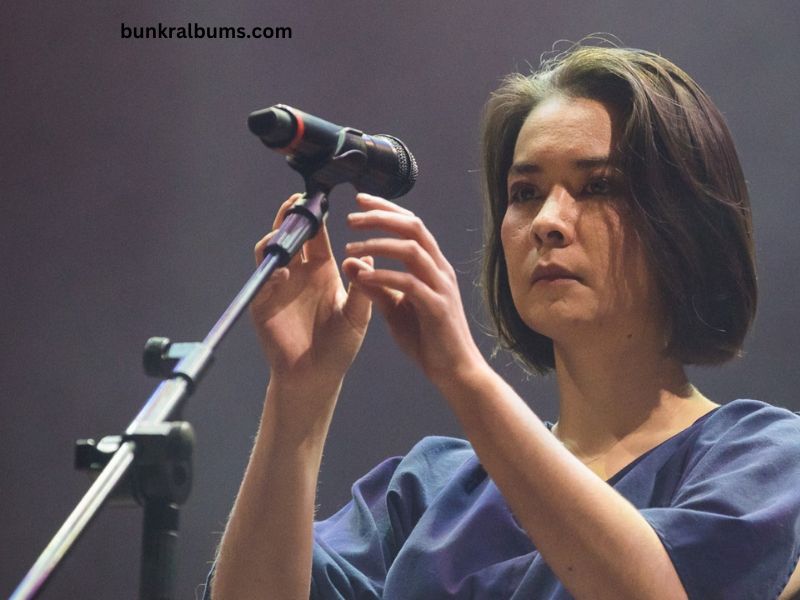Mitski My Love Mine All Mine, the Japanese-American indie rock artist known for her confessional lyrics and emotional depth, has consistently captivated audiences with her exploration of love, identity, alienation, and personal struggle. Her 2022 album Laurel Hell marked another evolution in her sonic landscape, showcasing a more polished, retro-inspired sound while continuing her characteristic introspection. One of the standout tracks from the album is “My Love Mine All Mine,” a song that blends Mitski’s complex emotionality with a catchy, almost disco-like beat.
The lyrics of “My Love Mine All Mine” are an intricate expression of desire, possession, selfhood, and control within the framework of a romantic relationship. At its core, the song deals with the push and pull of longing, vulnerability, and the desire to own one’s love. But it also reflects Mitski’s ongoing exploration of the boundaries between self-love and love for others, as well as the tension between independence and connection. In this article, we’ll dissect the lyrics of “My Love Mine All Mine,” uncovering the deeper layers of meaning that Mitski weaves into her song.
Overview of “Mitski My Love Mine All Mine”
Released as a single in 2022 from Laurel Hell, “My Love Mine All Mine” is a striking blend of personal reflection and energetic, synth-driven pop. The song is driven by a catchy, bouncy rhythm that contrasts sharply with the weight of the themes it addresses. As with much of Laurel Hell, the track combines a retro sound (think ’80s synth-pop and new wave) with Mitski’s signature vulnerability and lyrical complexity.
In the song, Mitski sings about wanting to possess her lover in a way that speaks to both desire and insecurity. The title itself, “My Love Mine All Mine,” suggests an obsessive yearning, as if the singer wishes to claim her lover entirely—body and soul—whilst simultaneously grappling with the implications of such ownership.
But Mitski does not stop at simple love or obsession; she explores the emotional turmoil and self-awareness that accompany these feelings, turning the track into a meditation on the complex intersection of love and selfhood.
“Mitski My Love Mine All Mine” – A Breakdown of the Lyrics
Verse 1: Possession and Desire
The opening lines of “My Love Mine All Mine” set the stage for the emotional conflict that will play out in the song:
“I know what I want / And I know what I need / I know what I want / And I know what I need / It’s you, it’s you.”
The repetition of these lines reinforces the clarity with which Mitski declares her desire, creating a sense of urgency. There’s an almost childlike simplicity in the assertion: “I know what I want, and I know what I need.” This could imply a certain certainty or self-awareness, but the repetition also highlights the almost obsessive nature of the longing. The line “It’s you, it’s you” shifts the personal desire into the realm of possession—it’s not just about wanting or needing; it’s about claiming the person she loves as her own.
From the very start, Mitski is establishing the emotional foundation of the song: a yearning that feels all-consuming, a desperate need to possess, and perhaps to be possessed in return.
Chorus: Claiming and Ownership
The chorus delivers the titular phrase, “Mitski My Love Mine All Mine,” in a grand, almost anthem-like declaration. Mitski sings with a sense of power and ownership, but also vulnerability:
“My love, mine all mine,
My love, mine all mine,
I want to hold you,
I want to hold you,
I want to hold you.”
On one hand, the repetition of “mine all mine” is an assertion of control, a proclamation that the love she desires is hers and hers alone. Yet the addition of “I want to hold you” complicates the statement. It introduces a tenderness and intimacy that balances out the possessiveness. Mitski isn’t just claiming ownership of her lover, but she is also expressing a deep need for closeness, affection, and vulnerability. It’s as if she’s acknowledging that true love, while deeply wanting and needing to possess, also requires tenderness and an understanding of the other person as a separate being.
Verse 2: The Fear of Losing Control
As the song progresses, Mitski delves into the fear and insecurity that often accompany intense desire. In the second verse, she sings:
“I know what I am / But I am not what you see / I know what I am / But I am not what you see.”
This line reveals a disconnect between self-perception and how she is viewed by her lover. Mitski often deals with themes of self-doubt and the tension between internal and external identities. In this case, it could suggest that the narrator feels misunderstood or perhaps that her lover does not truly see her for who she is. The repetition of the phrase “I know what I am” implies some sort of self-awareness, but the contrast with the subsequent line—“But I am not what you see”—suggests that the persona she projects may not fully align with her inner reality.
The anxiety of not being seen or understood could further fuel her desire to claim the love of her partner, as if possessing them would allow her to solidify her own sense of identity. This internal conflict is reflected in the energy of the track, where the upbeat tempo contrasts with the depth of the emotional turmoil being expressed.
Bridge: A Shift in Tone and a Plea for Love
The bridge of the song introduces a slight shift in tone, both musically and lyrically. Mitski sings:
“I can’t be your one and only, but I can try / I can’t be your one and only, but I can try.”
Here, Mitski acknowledges a limitation, both in herself and in the relationship. Despite the intense desire to claim her love, she recognizes that she cannot be everything to her partner. This moment of self-awareness introduces a level of maturity and vulnerability. Rather than continuing the obsessive, possessive streak, the lyric acknowledges that love, in its purest form, cannot be solely about ownership or control—it also involves compromise, understanding, and balance.
The repetition of “but I can try” underscores the determination to work through these limitations, indicating a desire to continue giving love, even if it cannot fulfill every need or expectation.
Outro: Resolution or Reiteration?
In the outro, Mitski sings:
“My love, mine all mine…”
The song closes by returning to the title phrase, but there’s a sense of ambiguity in the repetition. Is Mitski’s declaration of “Mitski My Love Mine All Mine” an expression of victory, of achieving the love she desires? Or is it a resignation to the fact that love cannot be entirely controlled or possessed? The song’s cyclical structure, with its constant return to the possessive refrain, suggests an unresolved tension—one that leaves the listener contemplating the nature of love, identity, and ownership.
Themes Explored in “Mitski My Love Mine All Mine”
At its heart, “Mitski My Love Mine All Mine” explores the complexities of love and desire. Mitski’s lyrics dig into the fine line between longing for connection and attempting to possess another person. The song raises important questions about autonomy, vulnerability, and the desire to both give and receive love in a way that feels all-encompassing.
1. Possession and Identity
The desire to possess one’s lover is a central theme in the song, but it’s not a simple, one-dimensional wish for control. Instead, Mitski delves into the emotional intricacies of possession: What does it mean to truly “own” someone’s love? Can love ever be fully owned, or is the idea of possession inherently flawed? Mitski’s lyrical exploration of love as a form of ownership is complicated by her own self-doubt and the realization that even in romantic relationships, there are boundaries and limitations that cannot be overcome.
2. Vulnerability and Selfhood
While Mitski’s desire for control is palpable, she also lays bare the vulnerability that comes with loving someone deeply. Her acknowledgment of not being fully seen by her lover suggests a fear of being misunderstood or rejected. Her plea to “hold” her lover—an action that suggests intimacy and connection—competes with her possessive instincts, revealing the internal tug-of-war between independence and connection.
3. Self-Awareness and Compromise
The line “I can’t be your one and only, but I can try” represents a moment of growth and self-awareness. While Mitski initially projects an image of absolute control, she ultimately recognizes the limitations inherent in love. This humility, combined with her willingness to try, offers a note of resolution in the song’s otherwise tumultuous emotional landscape.
Conclusion
“Mitski My Love Mine All Mine” is one of Mitski’s most compelling songs, capturing the multifaceted nature of desire and love. Through her poignant lyrics, Mitski paints a picture of a love that is at once possessive, vulnerable, tender, and conflicted. It’s a love that longs for connection while grappling with the reality that love, as much as we may wish to control it, is never fully ours to own.
The song’s rhythmic energy and catchy beat, in contrast with its introspective and emotionally charged lyrics, create a powerful juxtaposition, drawing listeners into a deeper contemplation of what it means to truly love and be loved. Ultimately, Mitski My Love Mine All Mine” offers a poignant reflection on the complexities of human connection, love, and the tensions between selfhood and intimacy.







